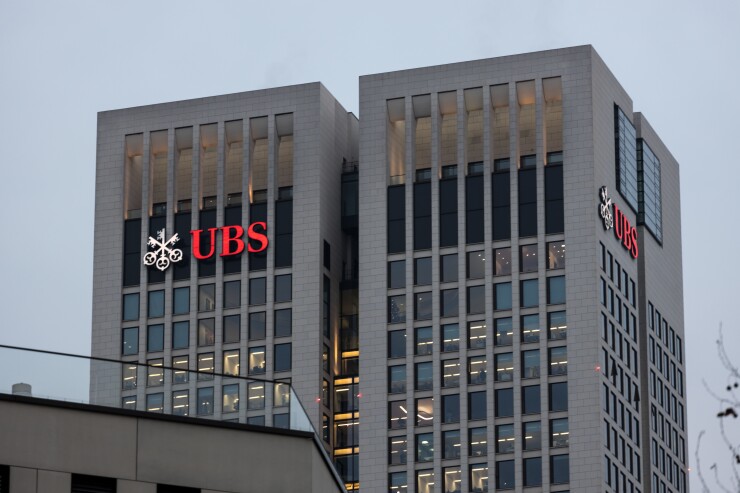UBS is reducing its base compensation for its low-end producers while making more modest cuts higher up the income-generation scale.
The new compensation policy rolled out by the Swiss banking giant on Thursday would cut payout rates next year for U.S. advisors producing less than $750,000 by between 2% and 4%. The actual reductions will depend on a variety of factors, including how long a given advisor has been with the firm.
Meanwhile some advisors, mostly at the $1 million production level or higher, will see a more modest 0.5% cut in their payout rates. For instance, advisors who have been with the firm for between five and 10 years and generate between $3 million and $4 million in annual revenue now earn a payout rate of 50.5%. That will fall to 50% next year, reducing a $4 million producer's compensation by $20,000 to $2 million.
But advisors will also be gaining ways to make up any money they might be losing from the grid changes. UBS is offering a new cash award of up to $1 million for advisors who hit certain growth targets. Those goals can be met by bringing in net new money, by striking up new relationships with clients with $1 million or more in assets or by achieving higher returns on assets under management.
READ MORE:
Advisors will also see the payouts they receive for helping clients establish credit lines with the firm's bank rise to 15% from 11.25%. And UBS is simplifying the revenue-production credits and payouts advisors receive for referring clients to internal cash-management products.
"This plan aligns advisor compensation with our strategic growth and profitability goals in the U.S., with our belief that advisors should be rewarded for growth and longevity and with our commitment to offering one of the industry's most competitive packages," a UBS spokesperson said.
The changes come
UBS's two other direct wirehouse competitors — Merrill and Morgan Stanley — are meanwhile largely holding steady with their pay policies next year. But both have similarly adjusted their grids in recent years to give low-producing advisors incentives to bring in more assets and client relationships.
Andrew Tasnady, an industry compensation consultant and founder of Tasnady & Associates, said UBS does stand out for applying low compensation rates at a much higher threshold — less than $750,000 — than most of its competitors. That's generally in line with the firm's stated desire to work mostly with high net worth clients.
"UBS is positioning itself as a higher-average-production type of company, so it's fine for them to have higher production levels where they start to reduce comp significantly," Tasnady said.
Phil Waxelbaum, the founder of recruiting firm Masada Consulting, said it's the reductions at higher production levels that are going to be hardest for advisors to stomach. That's especially true in a year in which UBS's direct rivals haven't made similar cuts.
"You should never be the last one to decide to make a negative change, especially when all your primary competitors have already said they are staying the course," Waxelbaum said. "There is no upside in that."
The compensation changes come after UBS executives have said one of their main goals is to improve profit margins in their U.S. wealth business. Responding to an analyst's question last month about why the U.S. wealth division's pre-tax profit margin was only 12%
"At this point, that's going to be the biggest driver of getting us to a cost-to-income ratio below 70% and returns to around 15% by the end of 2026," Ermotti said. "We know that's the ambition for us, and we're going to work over the next two years to get there."
Of the 5,986 advisors UBS reported having in its Americas division in the third quarter, very few are likely at the "penalty box" production level, Tasnady said. And those who are most likely have been encouraged to join teams with colleagues generating higher revenue levels.
UBS advisory teams will see compensation changes
Another change UBS is making will also most likely result in compensation reductions for members of advisory teams. The firm is eliminating what it calls its Combined Team Grid, which had allowed wealth managers on advisory teams to be paid out a percentage of the group's total production.
UBS is instead moving exclusively to what it calls its Highest Producer Grid. That allows advisors on a team to receive payouts only as a percentage of the revenue generated by the highest-producing member.
The change could have vastly different results depending on how teams are set up. A $10 million group in which a single member produces $8 million a year will get to keep most of the compensation it had been making before. But a four-person $10 million team in which each member had contributed $2.5 million in revenue will see a big drop.
The move to the Highest Producer Grid brings now brings UBS in line with its competitors in the industry.
Tasnady said he had applauded UBS for adopting its Combined Team Grid in 2017. The decision then seemed an innovative response to the team-joining trend now prevalent in wealth management.
Roughly 70% of UBS's U.S. advisors now belong to teams.
"In my mind, the team-based compensation system was a leading benefit at UBS," Tasnady said. "That's the direction that seemed to make the most sense, to pay teams on total team compensation."






